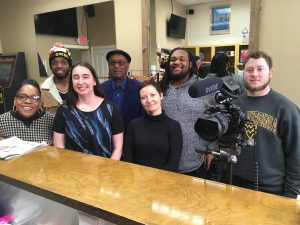Founded in 2014, Baltimore Traces: Communities in Transition is a collaborative public humanities project that brings together UMBC classes from a variety of disciplines to create media and cultural documentation focused on Baltimore residents and neighborhoods. The central question of the project is: How do city neighborhoods change, and more centrally, how do the people who live and work in those neighborhoods feel about those changes?
The project builds on previous interdisciplinary collaborations including Mill Stories (Michelle Stefano and Bill Shewbridge) and Mapping Baybrook (Nicole King and Steve Bradley) focused on neighborhoods at the center of deindustrialization. In 2014, we collaborated with the Center for Emerging Media a Baltimore non-profit founded by radio host Marc Steiner to create podcasts for public radio. This collaboration began in spring, 2014, when students from four UMBC classes teamed up to produce Stories of Deindustrialized Baltimore, a five-part radio series aired on the Marc Steiner Show on WEAA 88.9 FM.
The project expanded in spring 2015 as part of a Hrabowski Innovation Fund Grant, “Baltimore Stories: Emerging Media Across the Curriculum.” The project continues to evolve, with new projects focusing on Baltimore’s many neighborhood developing each semester. Since its beginning, public programming has been an integral part of the project. In 2017, Baltimore Traces began collaborating on public history zines with artist Markele Cullins (UMBC ’18, UCLA) to better share our work across the digital divide in Baltimore city.
In 2019, after a longterm exploratory partnership with the Maryland’s folk and traditions arts program Maryland Traditions, Baltimore Traces began as a partner of the Maryland Folklife Network of the Maryland State Arts Council (MSAC). As a regional folklife center for MSAC, UMBC support activities that identify, document, support, or present the living cultural traditions of Maryland’s diverse communities from the arabbers who have used horses and wagons to sell produce throughout Baltimore city for over 150 years to quilters who might enter the 2026 Homage to Baltimore Quilting Competition. Much of the research and public programming from Baltimore Traces is also archived in the Maryland Traditions Archives in UMBC’s Special Collections.
In 2020, the College of Arts, Humanities, and Social Sciences (CAHSS) at UMBC launched a Public Humanities minor located in the Orser Center for Public Humanities in the Department of American Studies.
The inaugural director, Ashley Minner, continues to work with the Ashley Minner Collection. The Ashley Minner collection contains digital and analog materials pertaining to Baltimore’s contemporary urban American Indian community, with a focus on citizens of the Lumbee Tribe of North Carolina who migrated to Baltimore in the mid-twentieth century and their descendants. Drs. Sarah Fouts and Nicole King currently co-direct Orser Center for Public Humanities and the public humanities program within the Department of American Studies at UMBC, which contributes teaching and research for Baltimore Traces along with an advisory committee from across more than a dozen programs and departments across campus.
P. Nicole King, Kate Drabinski, and Joshua Clark DavisAll of the project’s media, which in addition to podcasts include digital maps, films, and zines, are archived here on the project website. The project has Institutional Review Board (IRB) approval and informed consent forms that are available for use in all associated courses. The project operates with informed consent of participants and supports community control of their stories and archives. We use a Creative Commons license, which states content is publicly available with credit to Baltimore Traces unless it is being used for a profit. In 2021, the Baltimore Field School emerged within UMBC’s public humanities program. The BFS works to build a collective approach to community engaged research that moves from extractive approaches to research and instead is aimed at building sustainable and ethical projects while helping make the university’s outreach infrastructure more equitable.
Working together to produce and share the engaging stories of city neighborhoods brings wider attention to issues such as deindustrailization, redevelopment, food insecurity, immigration, and housing insecurity affecting our city while broadening student perspectives on their place in a broader community.
We are currently working to reorganize the Baltimore Traces archive to make it more accessible and impactful for anyone wanting to know more about Baltimore and the people who live and work in its neighborhoods.
For more information, questions, or to get involved, contact Dr. Nicole King at nking@umbc.edu.

Nicole King, “A Place Called Poppleton: Investigating the Slow Violence of Redevelopment in West Baltimore,” Journal of Urban History, December 2025.
Nicole King, “Save Our Block: Public Humanities, Zines, and the Connecting the Classroom” in The Routledge Companion to Publicly Engaged Humanities Scholarship (Routledge, 2024)
Nicole King, Sarah Fouts and Tahira Mahdi, “Rethinking the Field in Crisis: The Baltimore Field School and Building Ethical Community and University Partnerships” Journal of Higher Education Outreach and Engagement, Volume 28, Number 1, (2024) 63-79.
Brandon Walsh, “Review: Baltimore Traces,” Reviews in Digital Humanities: Special Issue: Digital Pedagogy, (January 2022)
Nicole King, “Sounds of a City: Podcasts and Public Humanities in Baltimore,” Journal of Higher Education Outreach and Engagement, Volume 25, Number 1 (2021), 137-150.
The Baltimore Field School project (2020 – present): https://baltimorefieldschool.org/
P. Nicole King, Kate Drabinski, and Joshua Clark Davis, Baltimore Revisited: Stories of Inequality and Resistance in a U.S. City (Rutgers University Press, 2019).
Daniel Fisher, “A Typology of the Publicly Engaged Humanities,” Humanities for All, (2019).
“Baltimore Traces: Communities in Transition,” Humanities for All, (2018).